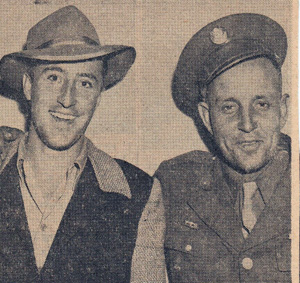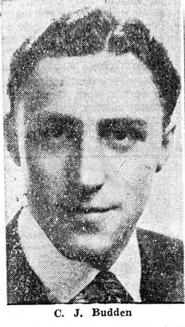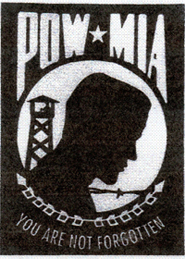Sioux Cityan Freed From Japs; Was On Wake as a Plumber
Mr. and Mrs. Zeno Budden, 1523 Pierce street, have received a telegram from the provost marshal in Washington informing them that their son, Clarence J. Budden, has been released from a Japanese prison camp. His physical condition was reported as good.
Clarence Budden left Sioux City June 1, 1941, to engage in plumbing work for a construction firm operating on Wake island. He was taken prisoner when the island fell to the Japanese December 24, 1941, and was transferred to a prison camp in Japan where he was confined until the Americans took over and he was liberated. Mr. and Mrs. Budden are expecting their son home soon.
Source: The Sioux City Journal, September 23, 1945 (photo included)
![]()

Japan’s drive to conquer the world trapped these two Sioux Cityans in widely separated parts of the Pacific and swept them into the same prison camp in Japan. They are Clarence Budden (left), son of Mr. and Mrs. Zeno Budden, 1523 Pierce Street, who went to Wake Island on a construction job shortly before the war, and Cpl. Cliff Gorsett, son of Mr. and Mrs. Arnold Gorsett, 920 Division Street, who was captured at the fall of Corregidor. |
Sioux Cityans Who First Met in Jap Prison Camp Now Home
Two Sioux Cityans, Clarence Budden and Cliff Gorsett, had to travel half way around the world to a prison of war camp in Japan in order to get acquainted. Their first meeting took place in August, 1944, in Ukuoha Fukuopa camp near Yawata.
“I was in the camp hospital when that particular contingent of prisoners arrived.” Budden recalls Cpl. Gorsett went through the camp asking for anyone from Iowa or from Sioux City. I heard about it and looked him up after I got out of the hospital. We went through a lot together after that.”
Budden, who is a plumber by trade, was doing construction work on Wake Island when the driving Jap forces cut off the Island and forced its surrender. He and other survivors were transferred to a prison camp near Shanghai, China, and kept there for eight months.
Worked in Steel Mill
Later, he was one of a party which was picked to work in the Yawata steel and iron works. He first was assigned to uploading heavy shipments of iron and steel, but the Japs soon learned that he was a pipe fitter and transferred him to that work.
Budden arrived in Japan September 18, 1942 and was there until American forces arrived this year.
Cpl. Gorsett, who has been in the army seven years, was stationed in the Philippines at the outbreak of the war. After that fall of Corregidor, May 6, 1942, he was placed in a Jap prisoner of war camp in the Philippines.
“They kept us there two years,” he says. “We worked long hours the food was poor and the living quarters were not good. Some of the men died or were killed by guards, but we kept our morale up by telling one another that the American army would be back.”
Both Sioux Cityans worked in the Japanese steel and iron mills after Cpl. Gorsett had been shipped to Japan. The working day began at 7 a.m. and ended about 5:30 p.m. About an hour was spent in traveling each way.
Paid Mere Pittance
“We were supposed to be paid for our labor, but the weekly amount of cash we received wasn’t enough to pay for the weekly allotment of cigarets.” Cpl. Gorsett says. “It left nothing to buy extra food, which was available to those who had money or merchandise to trade.”
“We received one shipment of Red Cross goods, which included clothing and overcoats. There wasn’t enough to outfit the 1,200 men in the camp, so we held a raffle to see who was to get what”
“One man traded his shirt for some soybeans with which to eke out his diet of rice, and was severely punished for it.”
Both men state that while the war was going on propaganda issued to Japanese soldier’s promised that each would receive a tract of land in San Francisco and an American wife after the United States had been defeated.
The first news from the outside world which they received concerned the death of President Roosevelt. This news was released almost immediately by the Japs.
Slipped Away From Camp
Soon after the official surrender, the men began slipping away from the prison camp and working their way toward where they expected American forces to be.
“The abrupt change in the Japanese people was almost miraculous,” Budden says. “As soon as they knew they were defeated, they began bowing and scraping wherever we met them. Japanese military police often gave us directions and assistance on our way across the country.”
Cpl. Gorsett already has reenlisted for another hitch in the army. This time, he expects to be sent to Panama. Although Budden has no plans for the immediate future, he is emphatic in the statement that he intends to stay at home.
Source: The Sioux City Journal, October 28, 1945 (photo included)
![]()


